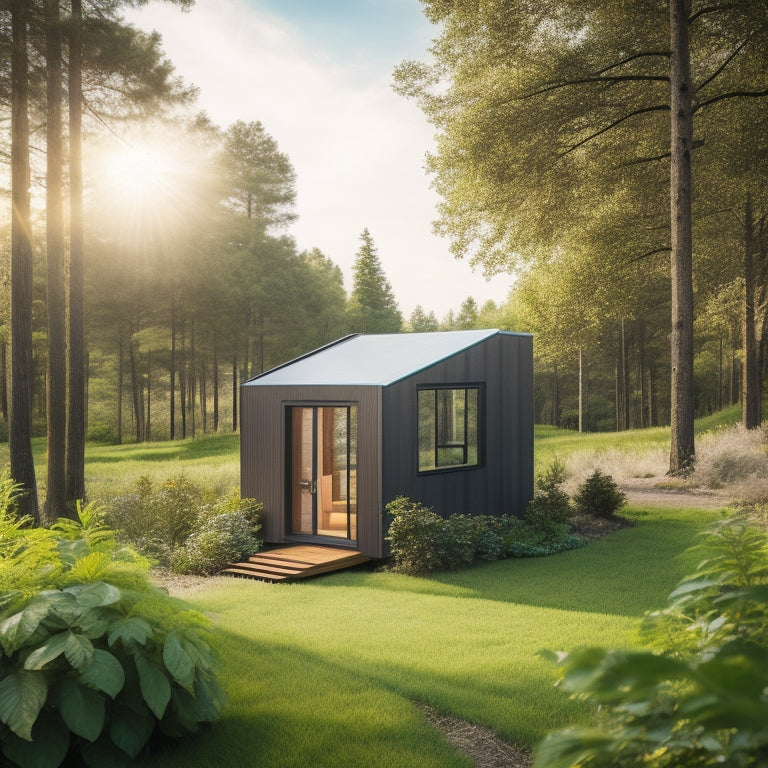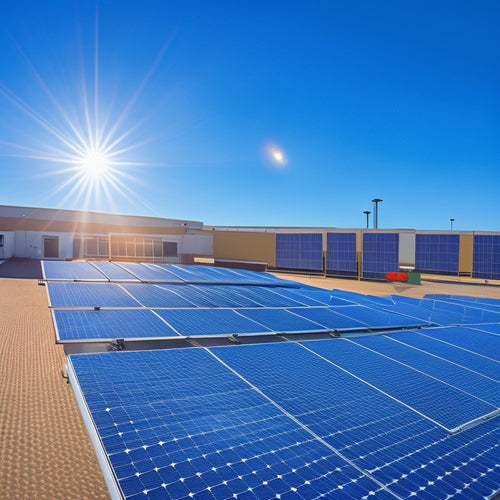
Why Small Homes Benefit From Renewable Energy
Share
By shifting to renewable energy, you can greatly lower your monthly energy bills, reduce your reliance on the grid, and contribute to a more sustainable future. With benefits including increased property value, stable energy costs, and a reduced carbon footprint, it's no wonder small homes are ideal candidates for renewable energy systems. Plus, with the ability to produce energy on-site and store excess for later use, you'll enjoy greater energy autonomy and more predictable expenses. As you investigate the ins and outs of renewable energy for your small home, you'll uncover even more advantages to this smart investment.
Overview
- Small homes benefit from renewable energy as it reduces reliance on the grid, lowers utility bills, and contributes to a reduced environmental impact.
- Renewable energy systems increase property value, potentially adding up to $15,000, and provide a stable energy cost, reducing budget stress.
- Energy-efficient strategies, such as upgrading appliances and optimizing heating and cooling, can reduce consumption by up to 30% in small homes.
- Renewable energy systems, like solar power, provide energy autonomy and efficient energy management, allowing homeowners to produce energy on-site.
- Long-term cost savings from renewable energy systems can outweigh initial investment costs, resulting in significant financial benefits for small homeowners.
Solar Panel System for Small Homes
As you consider shifting to renewable energy for your small home, a solar panel system is an attractive option that can provide a significant portion of your electricity needs.
You'll want to investigate the different solar panel types, including monocrystalline, polycrystalline, and thin-film, to determine which is best suited for your home's energy requirements.
Conducting an energy audit energy assessment to assess your energy needs and historical consumption will help you make an informed decision.
The installation process typically begins with a site assessment to determine the ideal panel placement and angle.
Next, the installation team will prepare your roof, install the mounting system, and connect the panels to an inverter, which converts DC power to AC for your home's use.
A net meter will also be installed to track your energy production and consumption.
Home Solar Panel Costs Breakdown
Your investment in a solar panel system for your small home hinges on understanding the costs involved.
You'll need to take into account the type of solar panels, their efficiency, and quality. There are two main solar panel types: monocrystalline and polycrystalline. Monocrystalline panels are more efficient but pricier, while polycrystalline panels are more affordable but less efficient.
In addition to the panel costs, it's crucial to evaluate the costs of solar battery storage systems, which can range from $5,000 to $15,000 or more, depending on the size and type.
Installation costs vary depending on the complexity of the installation, roof size, and local labor costs. On average, installation costs range from $2.50 to $3.50 per watt.
For a typical small home, a 5-kilowatt system would cost between $12,500 and $17,500.
Be sure to factor in additional costs, such as inverters, mounting hardware, and permits.
Benefits of Renewable Energy Sources
As you consider switching to renewable energy sources, you'll want to know the benefits you can expect.
You'll save money on energy costs, as renewable energy can reduce your reliance on the grid and lower your utility bills.
By utilizing renewable energy, you'll also reduce your environmental impact, contributing less to climate change and air pollution.
In addition, solar power systems can provide energy autonomy, enabling efficient energy management and breaking free from grid reliance Energy Independence.
They can even increase your property value, selling for up to $15,000 more than non-solar homes.
Energy Cost Savings
Renewable energy systems can slash your monthly energy bills, a welcome respite from the constant upward creep of traditional fuel prices.
By capturing power from sources like solar, wind, or geothermal, you can greatly reduce your reliance on expensive fossil fuels. This means more money in your pocket and greater control over your budget management.
You'll appreciate the predictable, stable energy costs that come with renewable energy, allowing you to allocate your resources more effectively.
With renewable energy, you're no longer at the mercy of fluctuating energy bills, giving you the freedom to focus on what matters most.
Environmental Impact Reduction
Carbon dioxide emissions, a byproduct of fossil fuel combustion, are a major contributor to climate change. As you shift to renewable energy sources, you're taking a significant step towards reducing your carbon footprint and encouraging sustainable living. By utilizing clean energy, you'll not only minimize your reliance on fossil fuels but also contribute to a cleaner environment.
| Renewable Energy Source | Environmental Benefit | Impact |
|---|---|---|
| Solar Power | Reduces CO2 emissions | Contributes to carbon neutrality |
| Wind Power | Conserves natural resources | Preserves natural habitats |
| Hydro Power | Minimizes water pollution | Supports eco-friendly practices |
| Geothermal Power | Decreases greenhouse gas emissions | Promotes energy independence |
| Biomass Power | Encourages resource conservation | Enhances environmental stewardship |
Small Home Energy Efficiency Gains
You can maximize your small home's energy efficiency by implementing energy-saving strategies, such as sealing air leaks and adding insulation, which can reduce your energy consumption by up to 30%.
Additionally, optimizing your home's systems, like upgrading to energy-efficient appliances and lighting, can further minimize energy waste.
Energy Saving Strategies
Optimizing energy efficiency is essential for small homes, as it can greatly reduce energy consumption and costs. You can take control of your energy usage by implementing various strategies.
| Energy Saving Strategies | Description |
|---|---|
| Energy Audits | Identify areas of energy inefficiency in your home |
| Smart Thermostats | Regulate temperature and optimize heating/cooling usage |
| Insulation Upgrades | Reduce heat loss and gain in your home |
| Efficient Appliances | Replace old appliances with energy-efficient ones |
| Passive Design | Design your home to maximize natural lighting and ventilation |
Optimized Home Systems
By addressing energy-saving strategies, you've taken the first step towards reducing your energy consumption.
Now, it's time to optimize your home systems to maximize your energy efficiency gains. Smart home technology can play an essential role in this process.
By integrating energy management systems into your home, you'll have real-time monitoring and control over your energy usage. This allows you to identify areas of inefficiency and make adjustments to optimize your energy consumption.
With optimized home systems, you can automate energy-saving tasks, such as turning off lights and appliances when not in use. This not only reduces your energy consumption but also increases your freedom from reliance on non-renewable energy sources.
Reducing Carbon Footprint Effectively
In conjunction with adopting renewable energy sources, reducing carbon footprint effectively requires a multi-faceted approach that involves careful planning and conscious lifestyle adjustments.
You'll need to assess your daily habits and identify areas where you can make a positive impact. Start by incorporating sustainable materials into your daily life, from the products you buy to the way you renovate your home.
Energy conservation is also essential, so look for opportunities to reduce your energy consumption, such as switching to energy-efficient appliances and turning off lights when not in use.
Increased Property Value Potential
As you work to reduce your carbon footprint, you're likely to increase the worth of your property in the process.
Installing renewable energy systems, such as solar panels or wind turbines, can enhance your property's appeal to environmentally conscious buyers. This increased market demand can lead to property appreciation, making your home more valuable over time.
In fact, studies have shown that homes with renewable energy systems can sell for up to 17% more than similar homes without them.
Long-Term Cost Savings Advantage
Most homeowners who invest in renewable energy systems can expect to reap significant long-term cost savings.
You'll enjoy lower utility bills, as you'll be generating your own energy and relying less on the grid. This translates to substantial utility savings over time.
Furthermore, renewable energy systems require minimal maintenance, reducing your overall energy expenditure.
By utilizing renewable energy, you're taking an essential step towards energy independence. This means you'll be less susceptible to rising energy prices, giving you greater control over your finances.
With renewable energy, you can lock in predictable energy costs, freeing you from the volatility of traditional energy markets.
As a result, you'll experience long-term cost savings, providing you with the financial freedom you desire.
Frequently Asked Questions
Can I Install Solar Panels on a Rented Property?
You can install solar panels on a rented property, but you'll need to review your lease agreements and understand your renter rights to guarantee you're not violating any terms, and obtain your landlord's permission before making any installations.
Do Solar Panels Work During Power Outages?
You're wondering if solar panels work during power outages? Typically, they don't, as they're grid-tied for safety reasons. However, with energy storage options, you can enjoy backup power, ensuring your solar panel efficiency isn't wasted, and you stay powered up during outages.
Are There Any Government Incentives for Small Homes?
You're eligible for government incentives when installing renewable energy systems; you can secure government grants and tax credits, considerably reducing your upfront costs, and increasing your energy independence.
Will Solar Panels Affect My Roof's Warranty?
You're wondering if solar panels will void your roof's warranty. Typically, they won't, but you'll need a roof inspection to verify it's structurally sound. Warranty coverage usually remains intact if the installation is done correctly and meets manufacturer specifications.
Can I Sell Excess Energy Back to the Grid?
You can sell excess energy back to the grid through net metering options or energy buyback programs, allowing you to offset your consumption and potentially earn credits or even cash, giving you more control over your energy usage.
Ready to Buy
As you utilize the power of renewable energy, your small home changes into a guiding light of sustainability, shining bright with a reduced carbon footprint. With solar panels absorbing sunbeams like a thirsty plant, you're not only slashing energy bills but also nurturing the planet. Your eco-friendly abode becomes a haven, insulated from the whims of fossil fuels, where you can bask in the warmth of long-term savings and a clearer conscience.
Related Posts
-

Solar Phone Chargers for Camping Essentials
Solar phone chargers are must-haves for your camping essentials, allowing you to stay connected while enjoying nature...
-

Top Portable Refrigerators for Camping Adventures
When you're camping, having a reliable portable refrigerator can make all the difference for keeping your food fresh ...
-

Essential Solar Panel Mounts for Commercial Properties
When it comes to essential solar panel mounts for your commercial property, durability and wind resistance are key fa...


